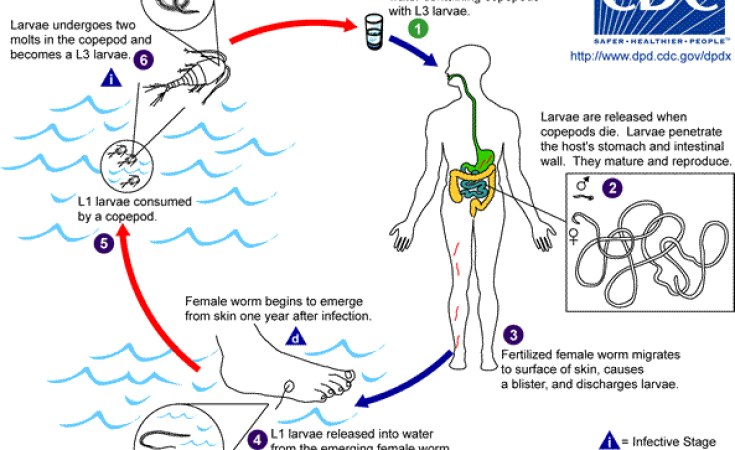The World Health Organization (WHO) is proud to announce that it has certified the Democratic Republic of the Congo (DRC) as free of transmission of Dracunculus medinensis, the parasite that causes dracunculiasis (Guinea-worm disease).
The announcement was made by Dr Tedros Adhanom Ghebreyesus, WHO Director-General, following a recommendation of the International Commission for the Certification of Dracunculiasis Eradication (ICCDE) at its 16th meeting (virtual, 22 November 2022).
Dr Tedros extended his warmest congratulations to DRC's Health Minister, Dr Jean-Jacques Mbungani Mbanda, as well as to all the field teams who have worked tirelessly to achieve this significant milestone.
Certification follows an extensive and thorough evaluation of the country dossier presented by DRC officials to WHO. The evaluation was conducted by ICCDE and was complemented by a country visit of an international certification team led by Professor Robert Guiguemdé between 19 July and 6 August 2022.
Evaluation for certification involves assessing several factors, including epidemiological surveillance data and official records, as well as surveying health facilities and villages in formerly endemic areas.
With the certification of DRC, WHO has now certified 200 countries, areas and territories, including 188 WHO Member States, as free of dracunculiasis transmission. Only six countries remain to be certified, including five endemic countries (Angola, Chad, Ethiopia, Mali, South Sudan) and one formerly endemic country (Sudan, which is now in the precertification stage).
"I am glad to start my new position with such good news", said Dr Ibrahima Socé Fall, the newly-appointed director of WHO's Department of Control of Neglected Tropical Diseases. "We now need to focus on certification of Sudan as the next milestone on the way towards global eradication of Guinea-worm disease".
A disease of poverty and deprivation slated for eradication
Dracunculiasis is a crippling parasitic disease, transmitted mainly when people drink stagnant water contaminated with parasite-infected water fleas. The transmission cycle takes 10-14 months, after which time a mature female worm emerges from the body.
While rarely fatal, the disease is debilitating and can leave sufferers unable to function normally for months on end. It primarily affects people in rural, isolated and deprived communities.
Dracunculiasis is one of the three diseases targeted by WHO for global eradication, together with yaws (another neglected tropical disease) and poliomyelitis. WHO's road map for neglected tropical disease calls for eradication of dracunculiasis by 2030.
Progress in the fight against neglected tropical diseases
As one of the diseases referred to under the banner heading of neglected tropical diseases, news of the interruption of dracunculiasis transmission in DRC comes in the wake of other recent success stories.
Malawi recently eliminated trachoma as a public health problem and, in August 2022, Togo became the first country to be acknowledged as having eliminated four diseases (dracunculiasis, lymphatic filariasis, human African trypanosomiasis and trachoma).
A joint achievement requiring continued vigilance
On behalf of all those who have suffered infection and disability as a result of the disease, WHO congratulates all those involved in the interruption of dracunculiasis transmission in the DRC and salutes the efforts of partners and donors, without whom this achievement would not have been possible. Notably, since 1986, The Carter Center has been a key global partner in the fight to consign Guinea-worm disease to the history books.
The Government of the Democratic Republic of the Congo is now committed, as per WHO post-certification recommendations, to maintaining disease surveillance and to investigating and monitoring all rumours of reintroduction of the disease. This is part of the wider effort to interrupt transmission in all remaining endemic foci and countries, leading in due course, it is to be hoped, to a declaration of global eradication of the disease.


